OP-ED: MY BEAUTIFUL WORLD
The cycle of life and waste on the urban edge of Simon’s Town
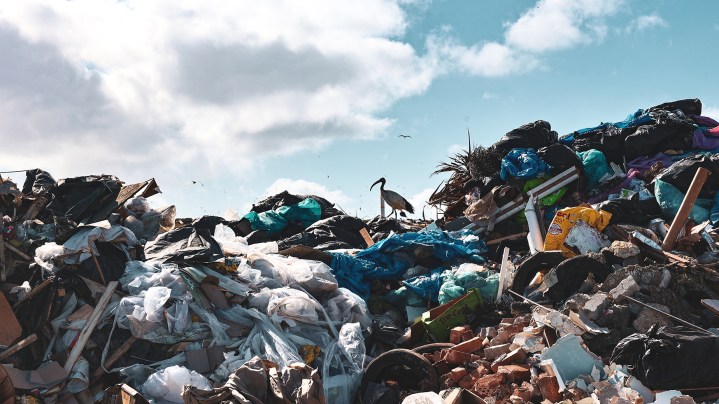
Living on the urban edge is a privilege we need to protect. As a so-called ‘foreigner’ who has made Simon’s Town in the deep south of Cape Town my home, I have been struck by the wealth of wildlife I encounter in the Atlantic Ocean and around my home.
With decreasing biodiversity worldwide, it is an incredible privilege to share our neighbourhoods with wild animals. Wild space and the wildlife that live in it are rare and precious beyond measure. It is fundamental that we restore, protect and develop wild places for future generations.
Sharing neighbourhoods with wild animals is possible. It takes innovation and a shared and collective commitment from the humans in those wild spaces and there are benefits for humans and animals alike.
There is an example of this in Simon’s Town, where wild baboons and (some wild) humans live in a shared space.
Baboons scour the neighbourhood, particularly on bin days, searching for organic waste. This is what attracts them. On an individual level, baboons have little business at my house as there is no organic waste for them to eat. I use a bokashi bin, which seals my organic food airtight and creates compost in less than a month.
“Beware of baboons” read a dozen warning signs in town. As shop-owners close their front doors, baboons of all shapes and sizes move through the town centre. Onlookers stand and watch as if they are part of a circus show.
A female carries her baby under her belly. She swiftly crosses the street to check the bins at the Navy premises while a young male artistically jumps onto the Victorian balcony near the liquor store.
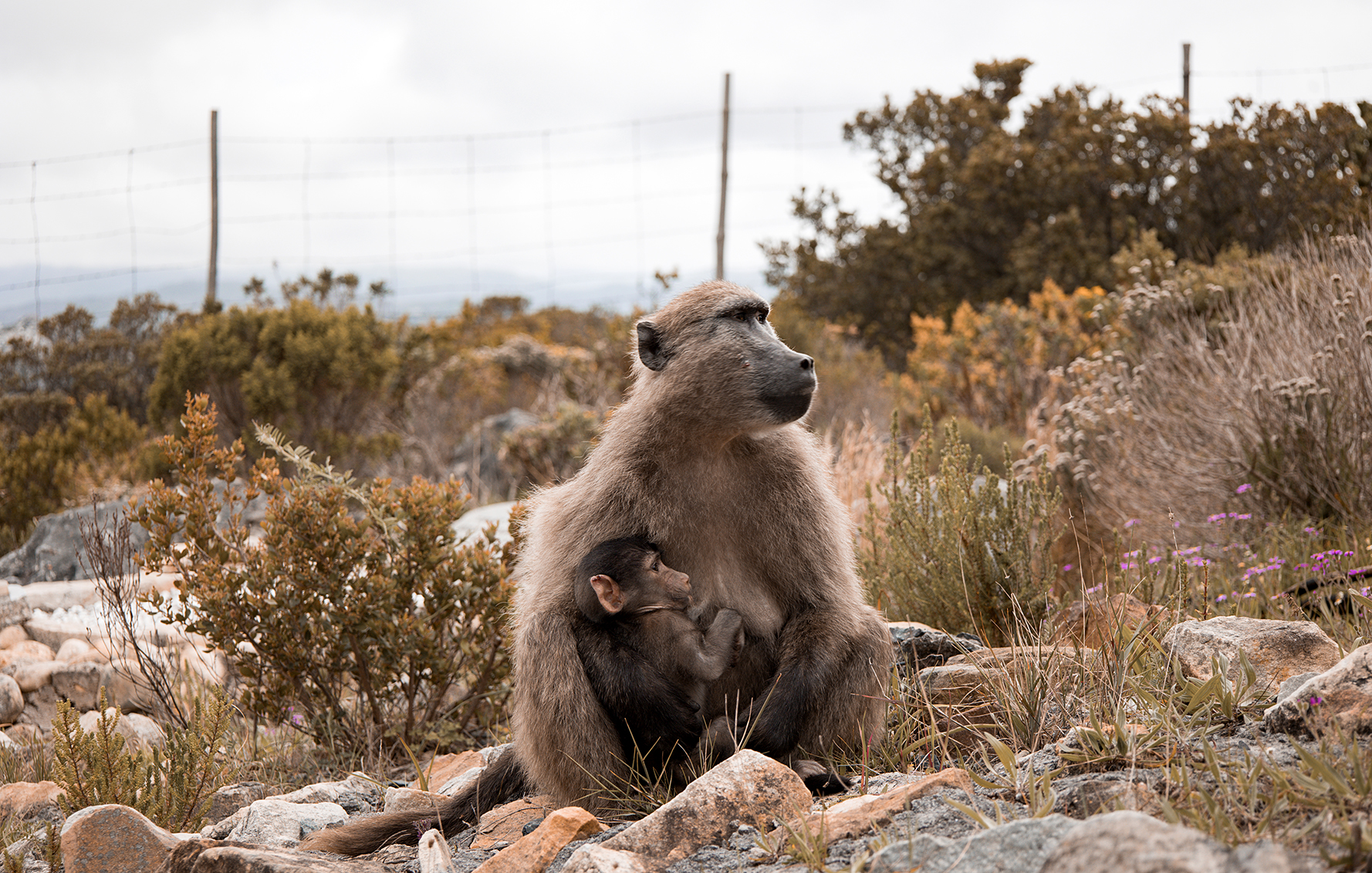
Despite their size and often assertive behaviour, baboons fear interaction with humans. (Photo: © Gunnar Oberhoesel)
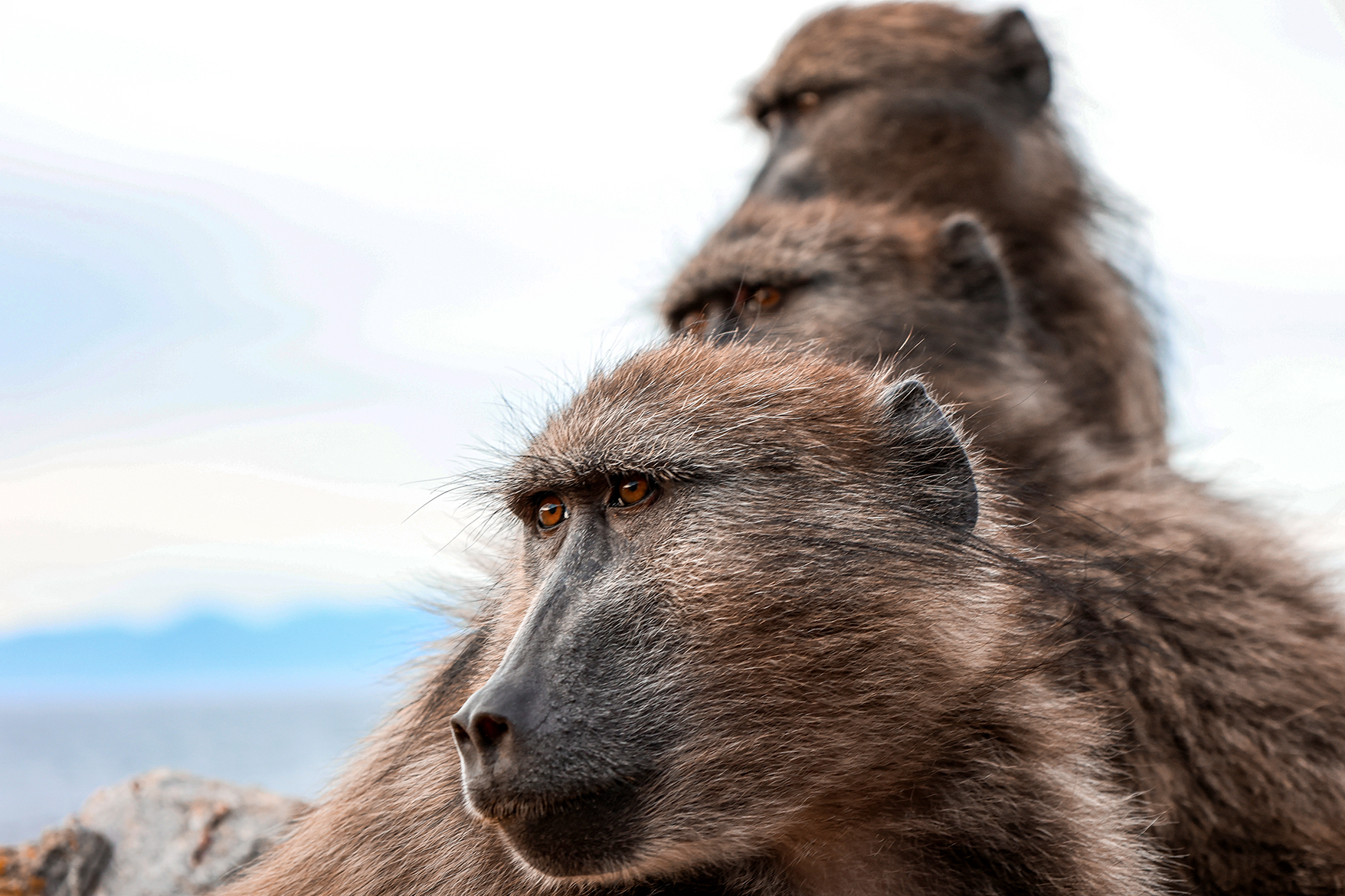
Baboons collide with vehicles, often suffer severe or fatal injuries from dog bites, and frequently get shot with pellet guns and other weapons by infuriated residents.(Photo: © Gunnar Oberhoesel)
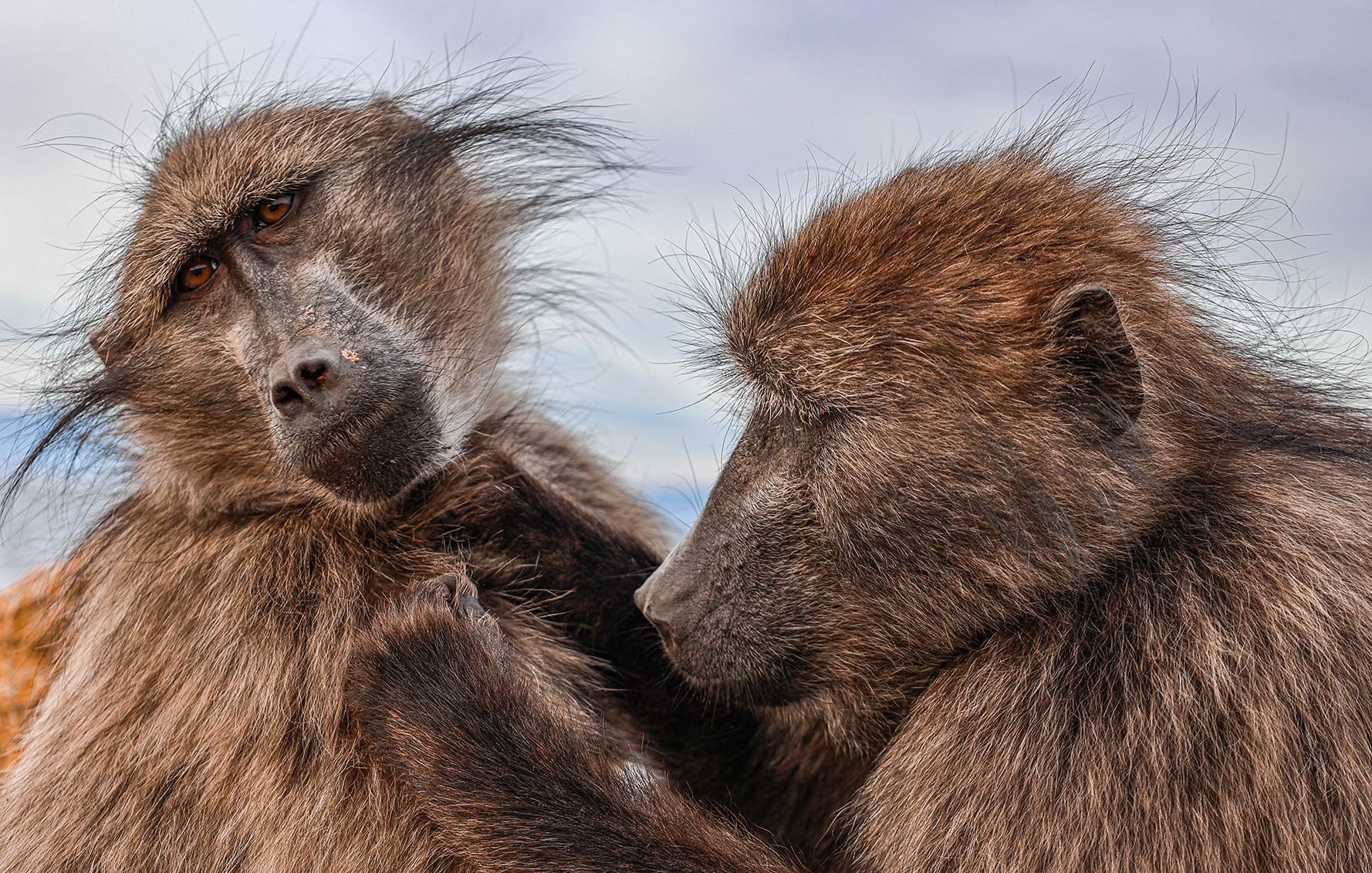
Baboons are social beings with a very strong hierarchy that has a massive long-term impact when certain troop members died or are killed. (Photo: © Gunnar Oberhoesel)
What might be a spectacle for visitors can be a daunting experience for the locals. Baboons sometimes empty trash cans and grab whatever food they can find. The ease of finding calorie-rich nutrients in towns and a shrinking natural habitat drive baboons into residential areas. This leads to a complex relationship between animals and humans. In some cases, baboons are adored but, unfortunately, hated and abused by others.
For an opportunistic feeder with a proclivity for calorie-dense food, half a loaf of bread is equal to four hours of foraging in the mountains.
Access to free food sources has habituated baboons to seek food in urban areas. Despite their size and often assertive behaviour, baboons fear interaction with humans. It has always been a predator-prey relationship, and being among humans is risky for them. Baboons collide with vehicles, often suffer severe or fatal injuries from dog bites, and frequently get shot with pellet guns and other weapons by infuriated residents.
To mitigate the conflict between humans and baboons, a new electric fence is under consideration along the firebreak near the waterfall in Simon’s Town. It is intended to help baboon monitors, who struggle to keep the animals in their natural, but depleted and shrinking, foraging grounds.
What is necessary is a shift on a city-wide scale, collaborations, partnerships and one-on-one education to find innovative ways to prevent food waste from going into bins and attracting baboons before it goes to the landfill.
Food Collection Project
This is why a new idea was brought to the table by Simon’s Town resident Luana Pasanisi. Pasanisi has for years been trying to work with residents, the city and business to reduce waste in the town. What if restaurants and businesses separate leftover food from general waste and give it to local farmers as pig food?
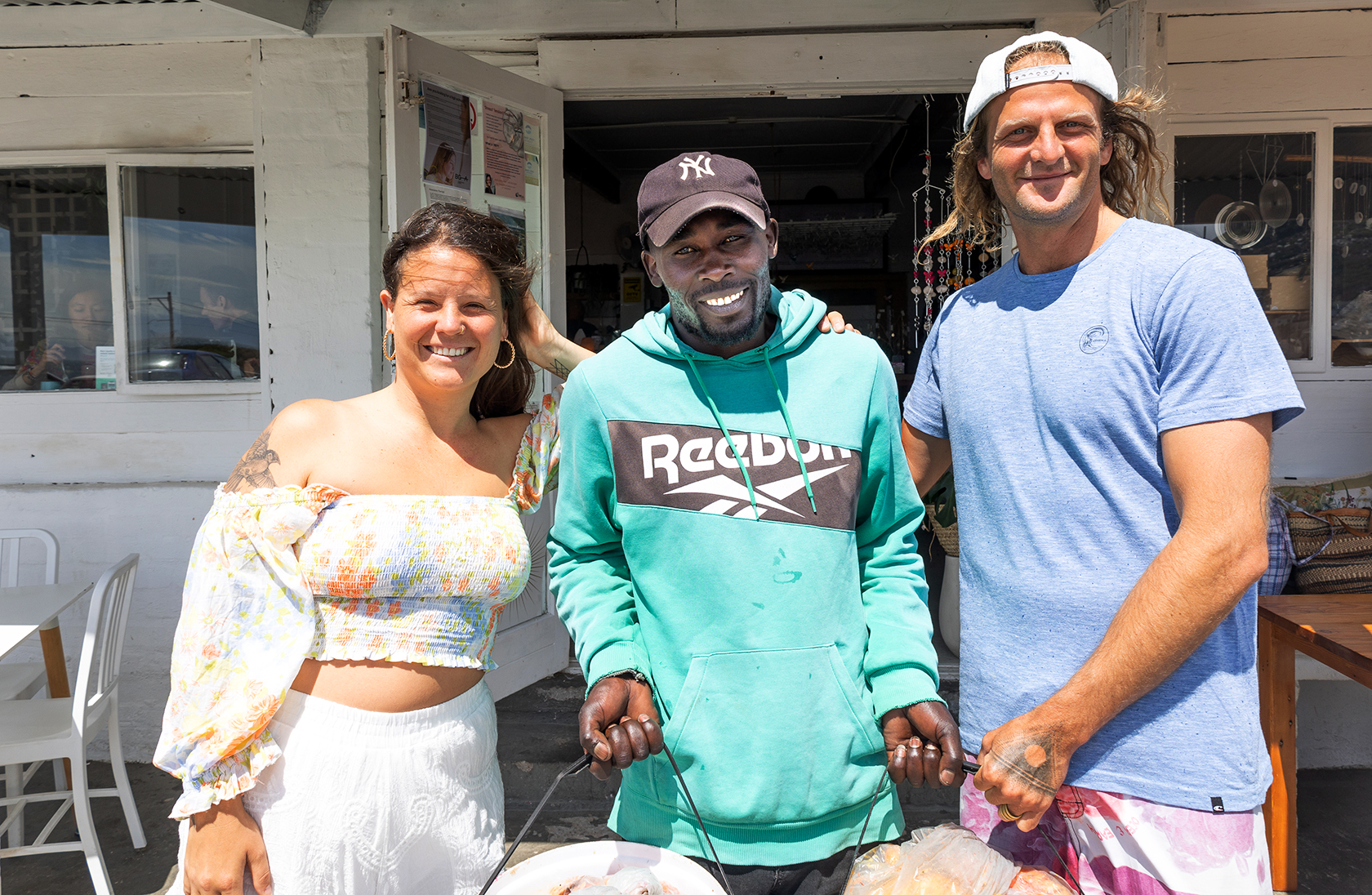
Layla Reid (left) and Garth Reid (right) from Blended Cafe help Dumi Shoko, one of the pig farmers, carry the wet waste to the truck. (Photo: © Gunnar Oberhoesel)
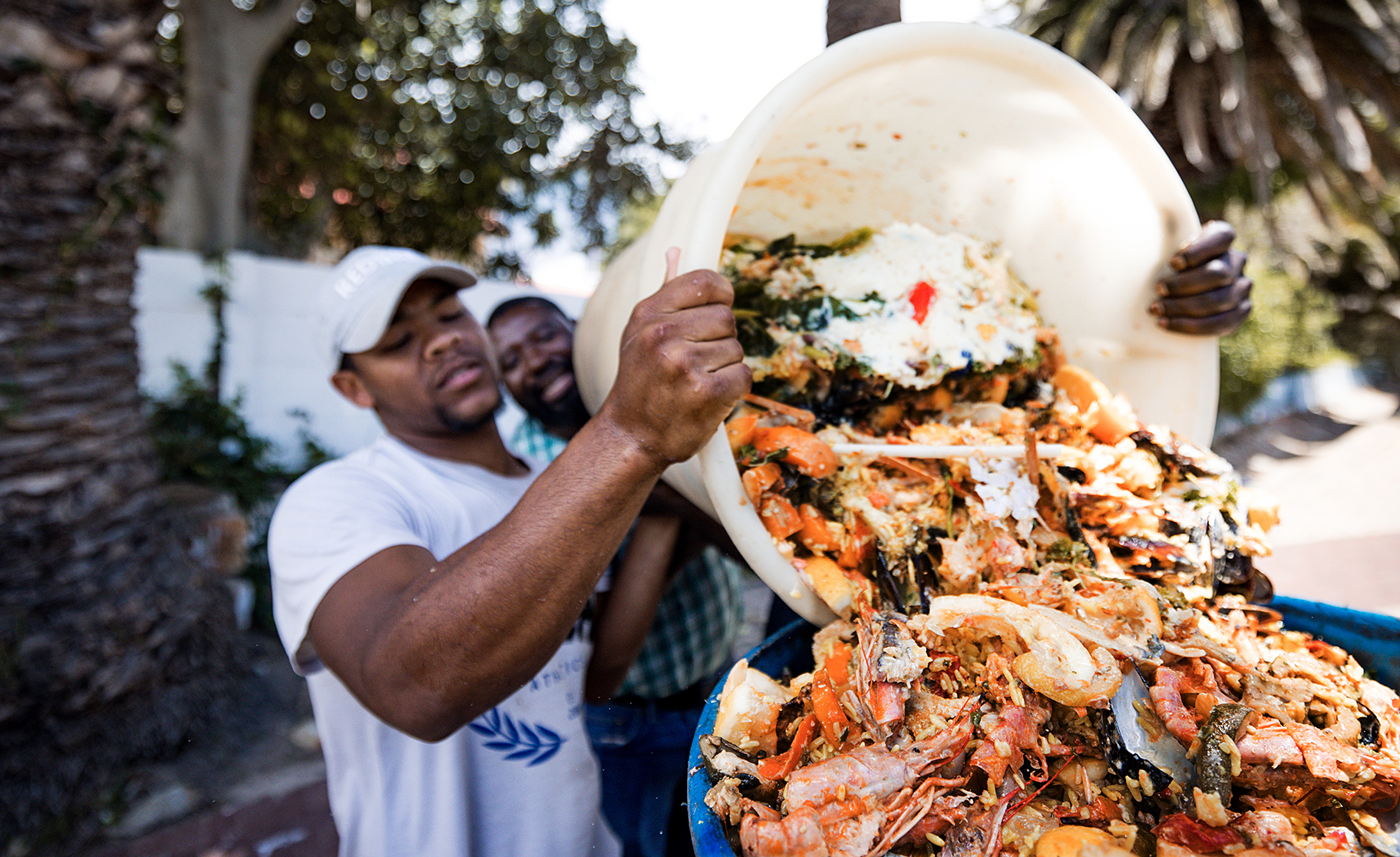
Wet waste is emptied into a truck by Brandon Overmeyer. This wet waste in turn keeps the baboon out of town, the pigs fed and the pressure on landfill sites much reduced. (Photo: © Gunnar Oberhoesel)
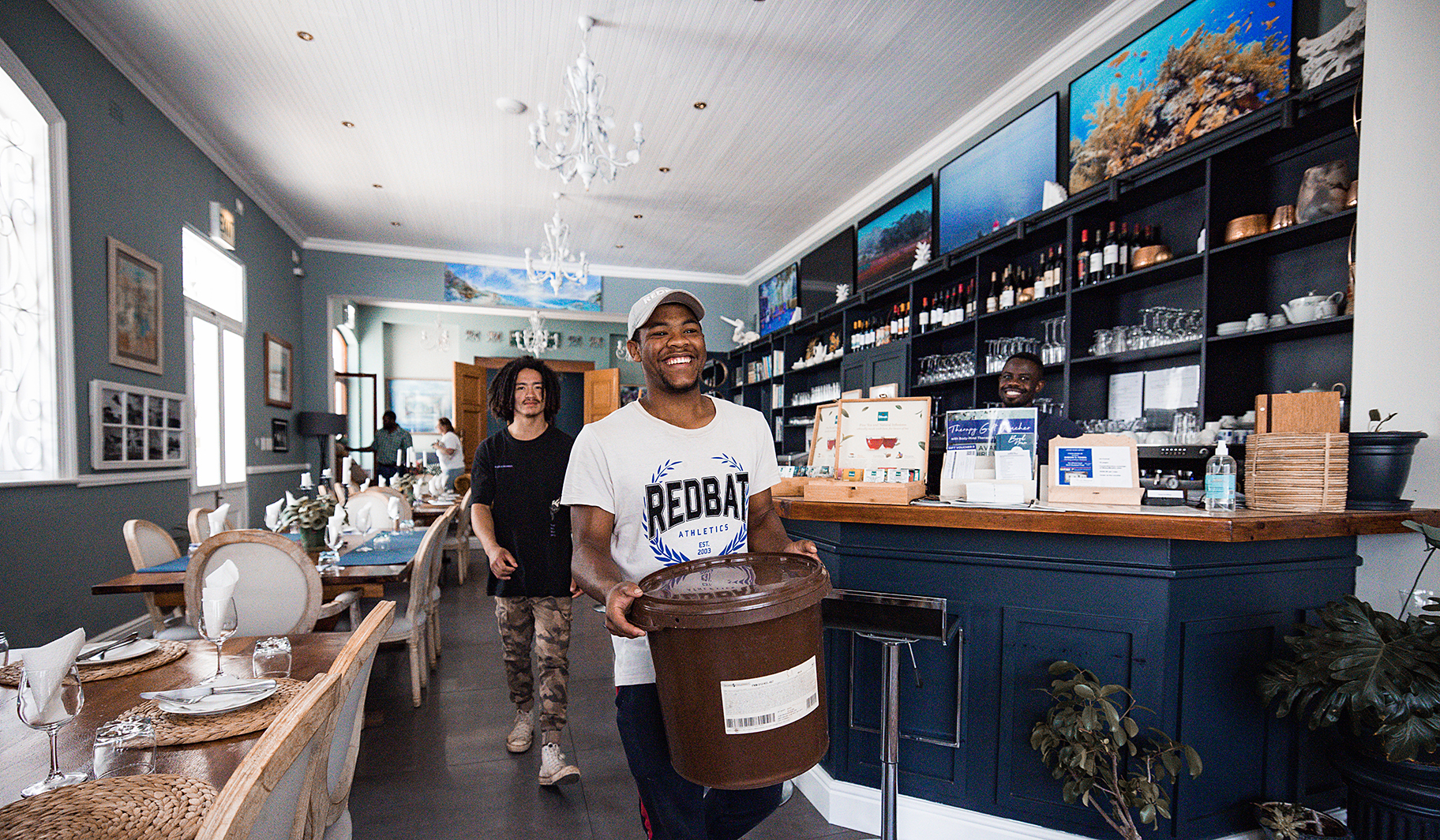
Pig farmer Brandon Overmeyer collects wet waste from the Willets Hotel in Simon’s Town. (Photo: © Gunnar Oberhoesel)
What started as a small-scale operation turned into a town-wide collaboration that is a true success story.
Every day, 1,000kg of food waste is diverted from landfill, reducing methane emissions and supporting Cape Town’s goal to prevent organic material from entering landfills.
Instead of farmers having to drive to Malmesbury for pellet food for their pigs, they get wet-waste meals for nothing – saving them up to R8,000 per month. An added benefit is that the pigs appear healthier, stronger and happier for feeding on high-quality waste.

Darron Nicholson feeding the pigs at his farm (Glo House) near Red Hill outside Simon’s Town. (Photo: © Gunnar Oberhoesel)
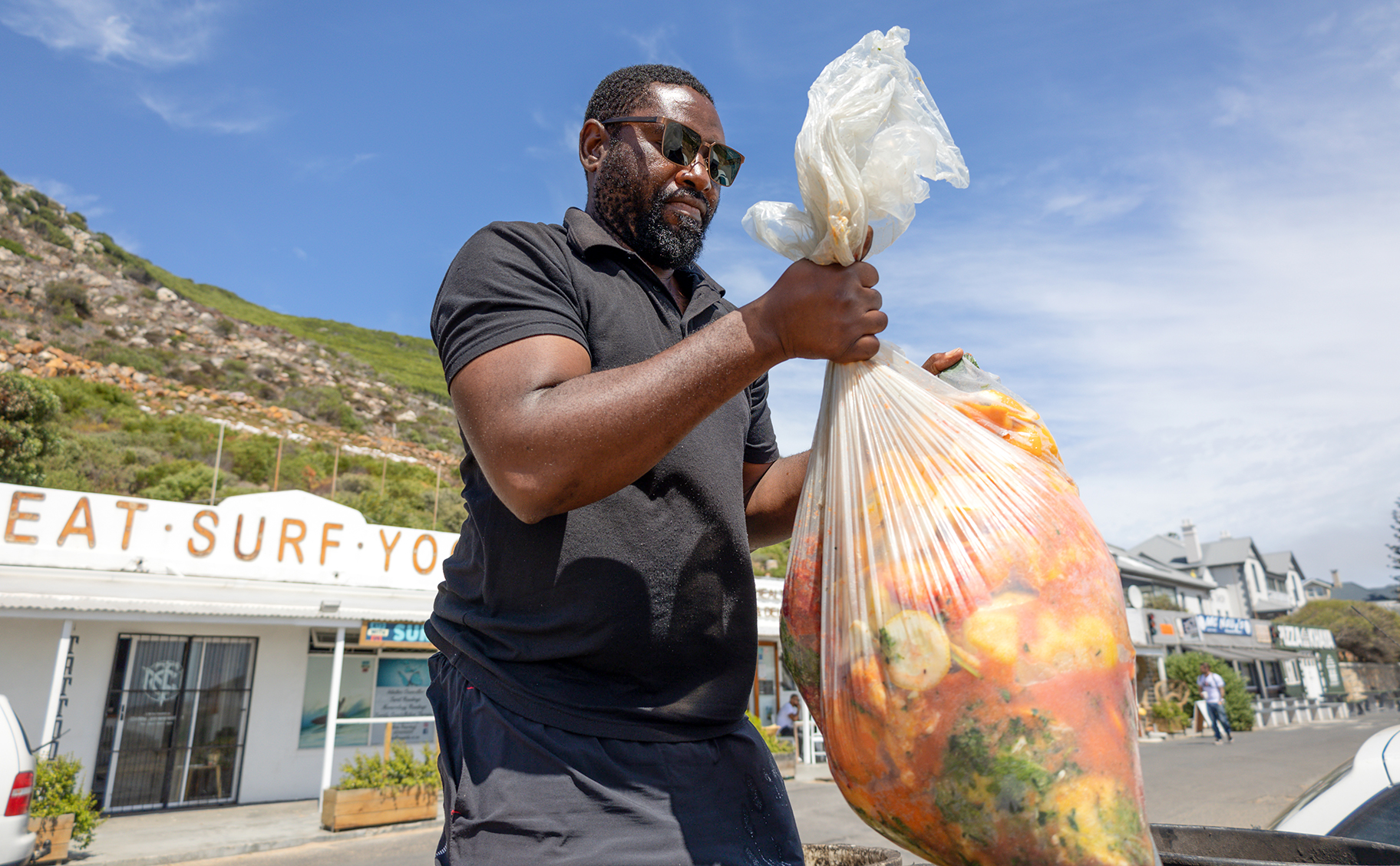
Farmer Einstein Sibanda collects wet waste from Blended Cafe in Glencairn. (Photo: © Gunnar Oberhoesel)
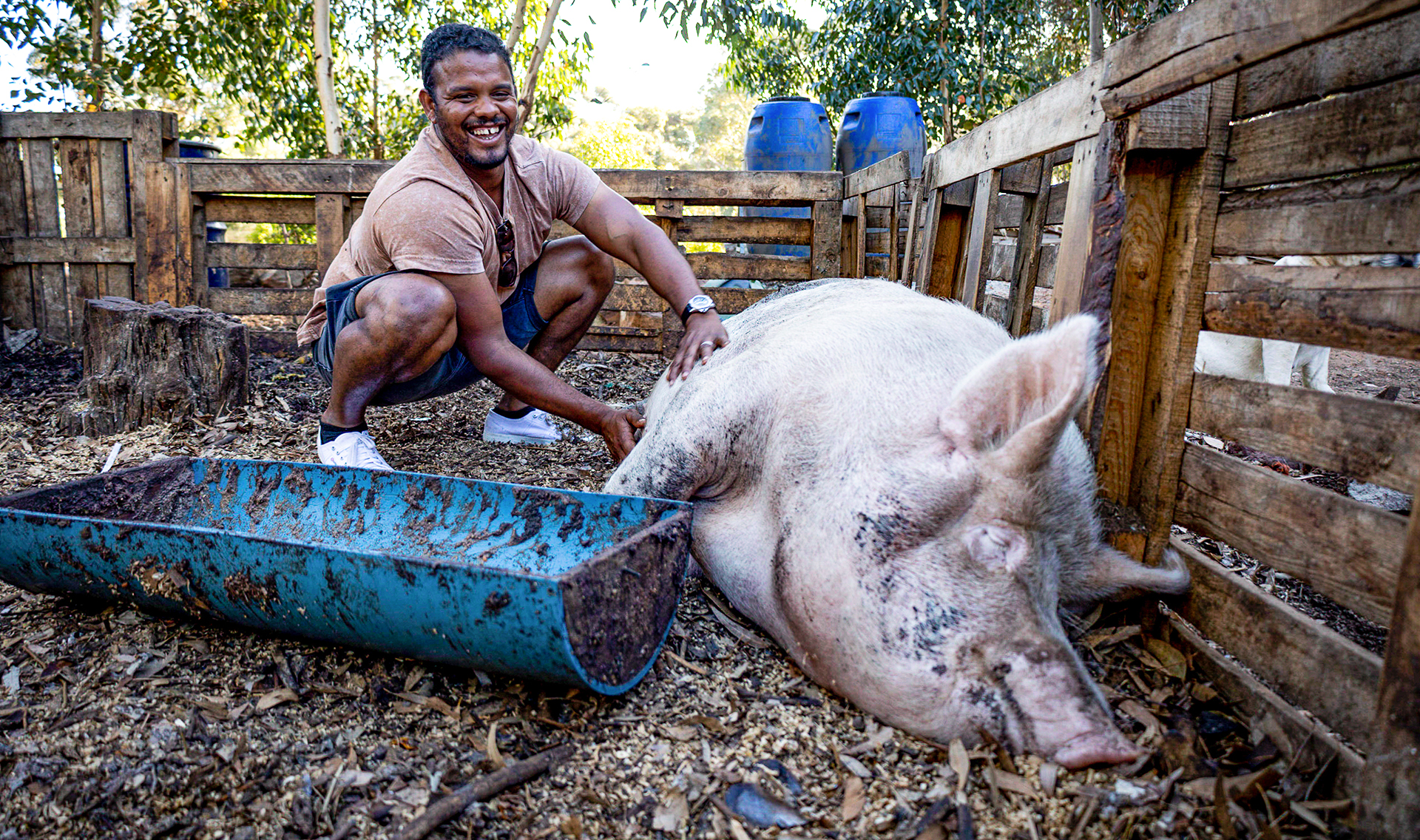
Darron Nicholson and his very happy pig on his farm in Redhill, Simon’s Town. (Photo: © Gunnar Oberhoesel)
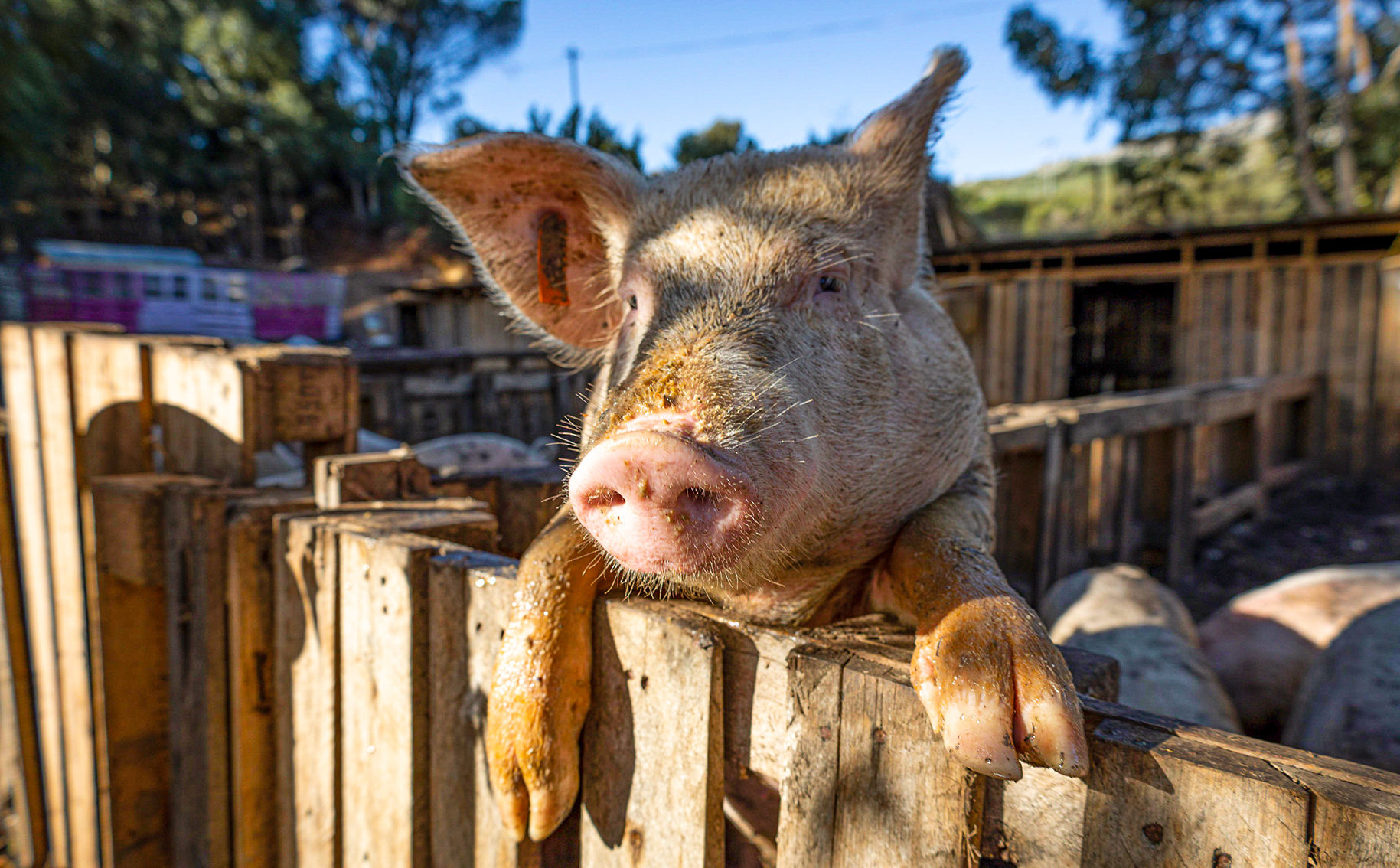
Instead of farmers having to drive to Malmesbury for pellet food for their pigs, they get wet-waste meals for nothing – saving them up to R8,000 per month. (Photo: © Gunnar Oberhoesel)
All restaurants in the area began separating their food waste from the regular waste stream. Farmers Einstein, Dumi, Kestrel and Darron drive into Simon’s Town almost daily to collect more than 100kg of leftover food. Upon return to their Redhill and Ocean View farms, the leftover food is fed to pigs or composted.
Local farmers are saving money through the new collaboration. “We used to spend R8,000 per month on food for the pigs. Today, the food we give them is much better, and by saving money, we can supply our community with more resources to help them in return. We give them cheaper compost and are able to cut the prices for pigs almost in half,” says farmer Darron Nicholson.
Darron is also the founder of a nonprofit shelter near Redhill, which offers a stable home and place for children in need – under the motto “One Love”.
The number of baboon visits to town is decreasing as less food waste enters the black wheelie bins.
In one calendar year, more than 35 tonnes of food waste have been diverted from landfills, thereby preventing the emission of potent greenhouse gasses.
“I am impressed with how well this works and the knock-on effects that it has, right throughout our sustainability efforts. We don’t want to put wet waste back in bags,” says Mike Israel of the Lighthouse Cafe in Simon’s Town.
More recently, the programme has encouraged private residents to join in. People of Glencairn and Simon’s Town can drop their fresh organic food waste at My Father’s House, a local NGO that supplies meals to people in need.
The Coastal Park landfill site outside Simon’s Town is easy to mistake for just another mountain on the Cape peninsula. Every day, tons of garbage from all over Cape Town is dumped in this landfill.
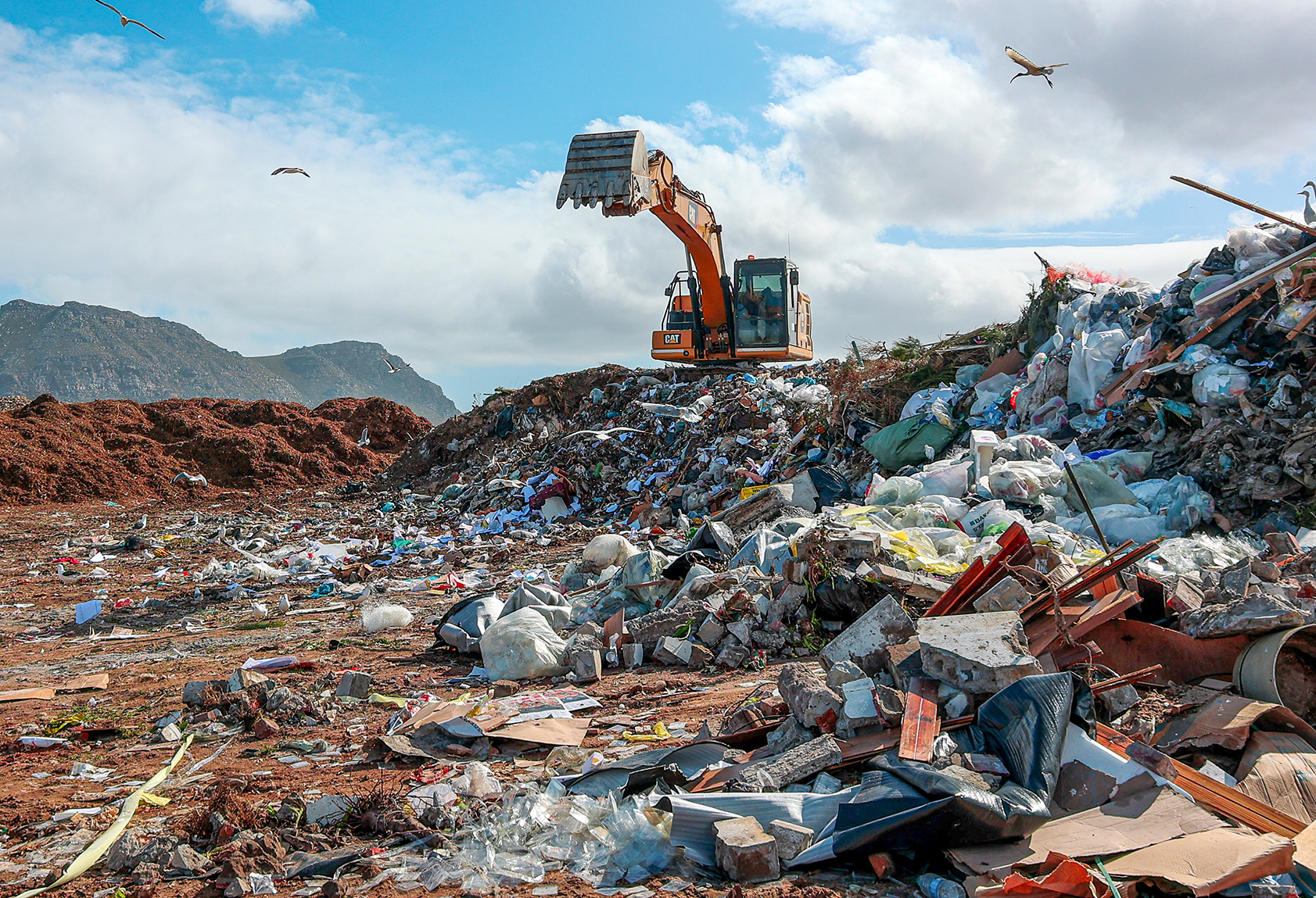
Landfill sites are controversial. Often located near lower-income communities and in environmentally sensitive areas, the decomposition of organic materials can release toxins that leach into and contaminate soil, water and air. Coastal Park near Muizenberg is one such example. (Photo: © Gunnar Oberhoesel)

The road to Coastal Park. (Photo: © Gunnar Oberhoesel)
Despite ongoing efforts to increase recycling and reduce food waste going to landfills, such huge dumps remain the dominant storage solution for humans’ garbage. Food waste, non-recyclables and builders’ rubble are all taken to landfill.
Driving out of Muizenberg, along the dunes of the Cape Flats, birds give way to a line of trucks coming to offload rubble and trash. Paper, cardboard, chip packaging and empty bottles lie scattered about the mountain of rubbish. The wind stirs up a strong smell. Hundreds of birds fly high above the site. The sacred ibis, glorified by the Egyptians, sits on top of the dump having an easy meal.
It is a mountain that has terrible consequences for our environment.
Landfill sites are controversial. Often located near lower-income communities and in environmentally sensitive areas, the decomposition of organic materials can release toxins that leach into and contaminate soil, water and air.
Visit Daily Maverick’s home page for more news, analysis and investigations
The City of Cape Town has recognised that, with the current speed of population growth and consumption, its current landfill space will run out within the 10 years. The Western Cape provincial government has passed legislation to ban organic waste from entering landfills – starting with a 50% reduction by 2022 and a full restriction by 2027.
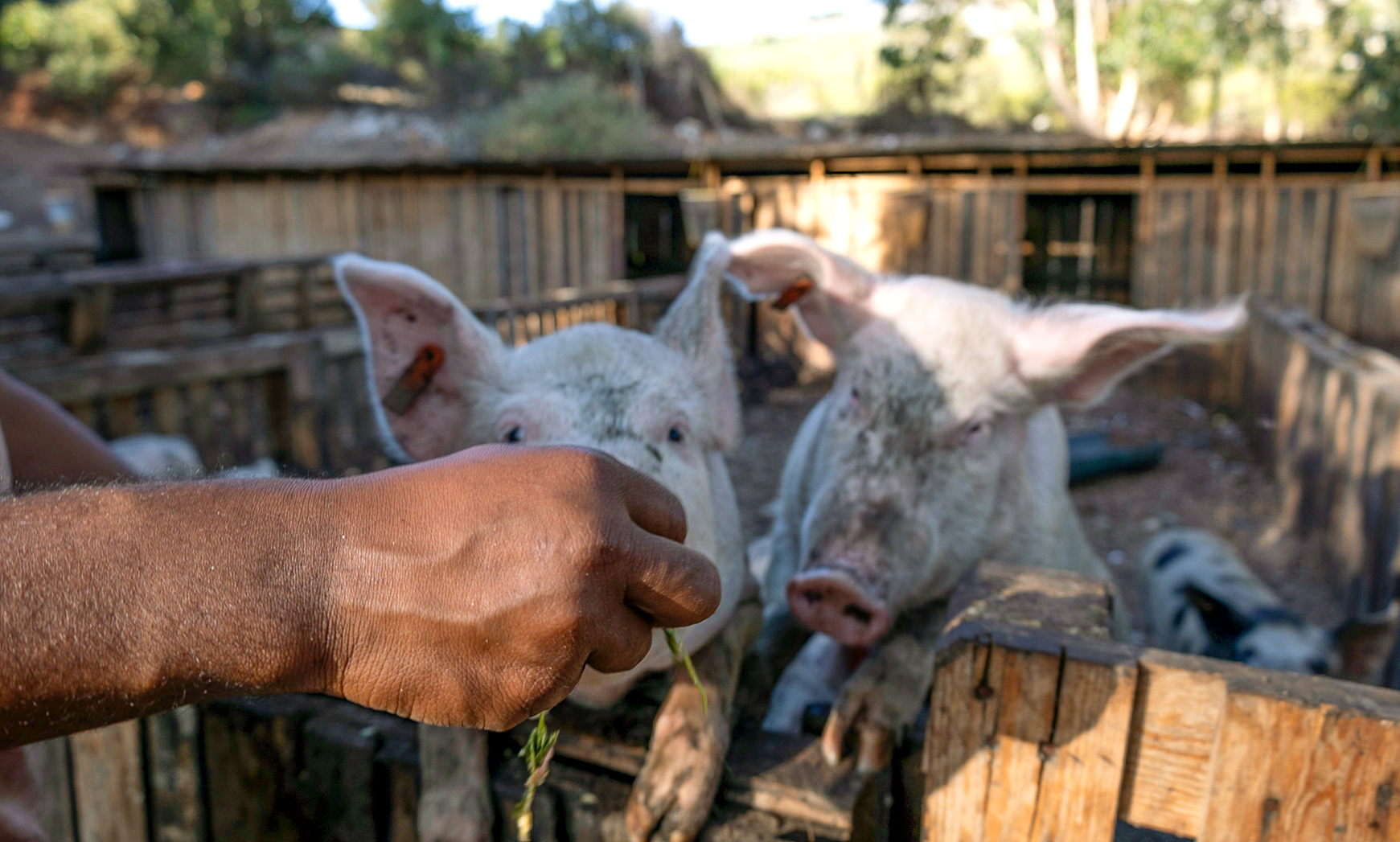
The number of baboon visits to town is decreasing as less food waste enters the black wheelie bins.(Photo: © Gunnar Oberhoesel)
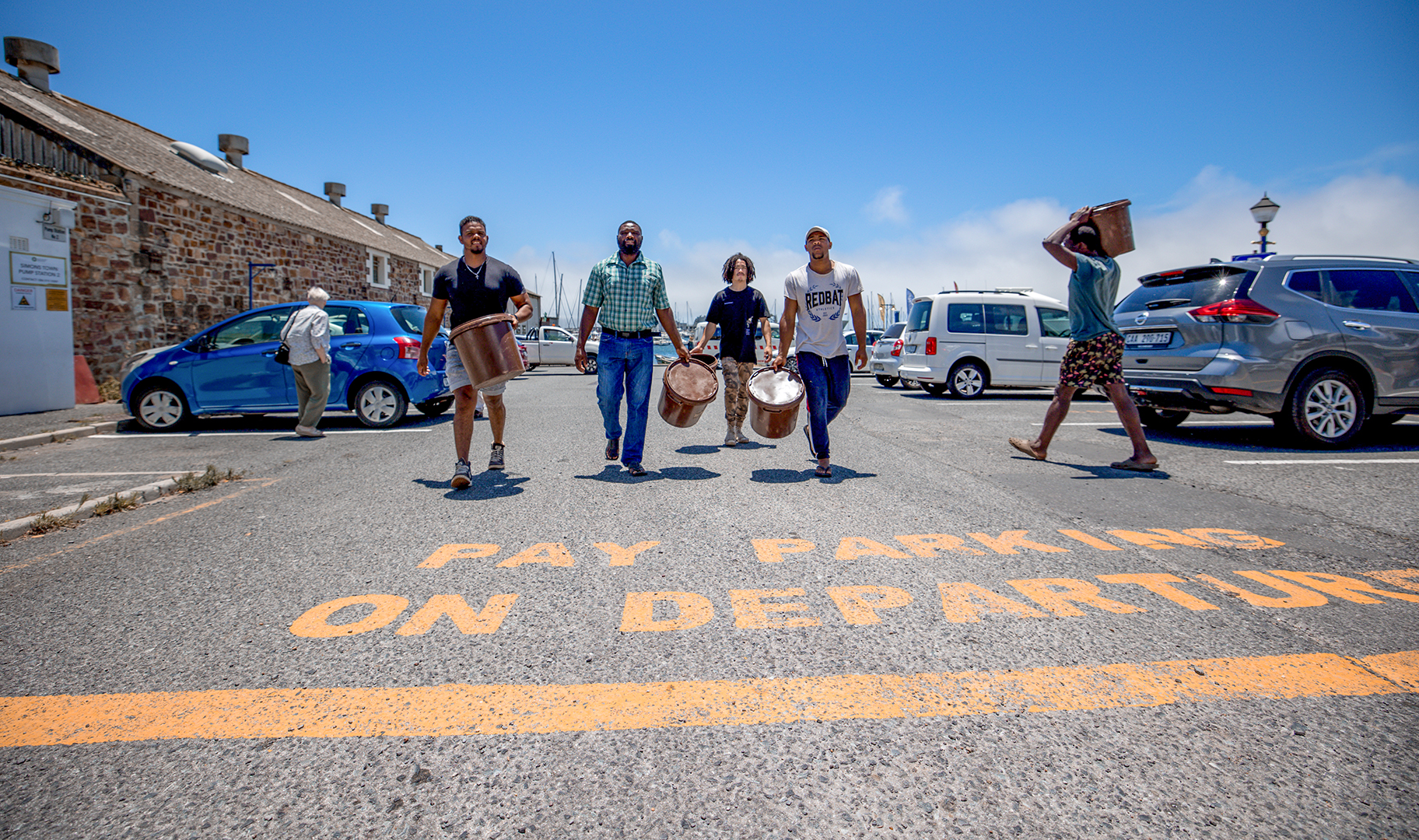
Collection day at Saveur Restaurant in Simon’s Town. (Photo: © Gunnar Oberhoesel)
According to Green Cape, organic waste makes up 30% of solid waste. Organic matter in landfills will often not break down properly due to a lack of oxygen and, as a result, releases harmful toxins and chemicals into the environment. It produces methane, a potent greenhouse gas contributing to global warming.
“The real key to recycling is source separation. If we can remove especially food waste from the waste stream, the rest of the waste is actually fairly clean and much easier to recycle,” says Melanie Ludwig, a founding member of Organics Recycling Association of South Africa.
According to the UN, “Composting of the organic waste we generate in our daily lives of inedible or unused food can reduce the dependence on chemical fertilisers, help recover soil fertility, and improve water retention and the delivery of nutrients to plants.”
The city has begun distributing composting bins to encourage Cape Town’s citizens to change. These bins can be collected at pick-up points throughout Cape Town and more information about home composting can be found on the council website. So far, over 24,000 composting containers have been distributed.
In nature, there is no waste. Everything is recycled. Everything is used. By making a simple collective effort with the organic waste we produce as humans, we can help the environment, help the baboons, help others and help ourselves.
Shared neighbourhoods and protecting wild areas are possible and bring immense benefits to all. Let’s not waste this opportunity. DM/MC
Gunnar Oberhoesel will be writing a regular column reflecting on living on the urban edge. He is a photographer and “ocean guide” who explores the southern peninsula coastline daily. He is particularly passionate about marine conservation and believes that when we create a connection with something like the ocean, we will feel moved to protect and conserve it.
Website: www.gunnar-oberhoesel.com
Instagram: instagram.com/theglobetrotterguy
Facebook: facebook.com/gunnaroberhoesel
Gallery: gallery.gunnar-oberhoesel.com






















 Become an Insider
Become an Insider
Thanks for the article. Yes people need to close the loop – and stop producing garbage. With compost bins and recycling – almost nothing needs to go to the landfill.
Thank you, Gunnar, for sharing what is indeed a very positive development in Simon’s Town, and for your honouring of our local wildlife.